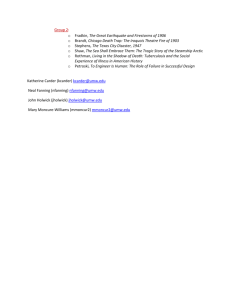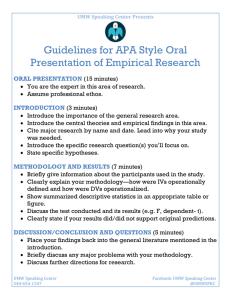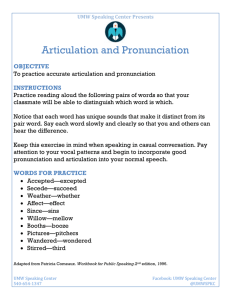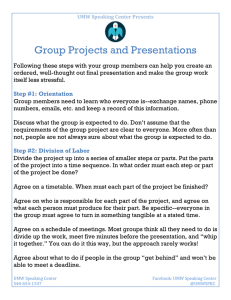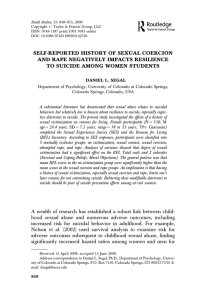Hazing, Harassing, and Hurting
advertisement
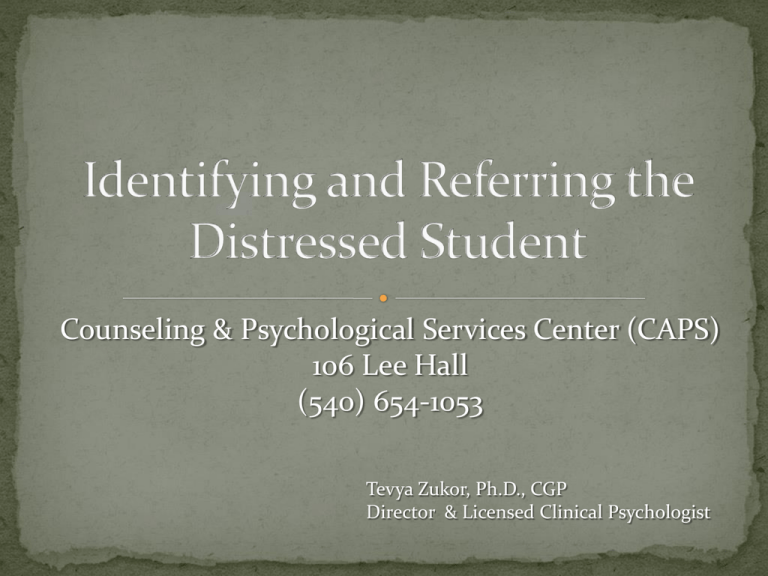
Counseling & Psychological Services Center (CAPS) 106 Lee Hall (540) 654-1053 Tevya Zukor, Ph.D., CGP Director & Licensed Clinical Psychologist Academic Difficulties Poor academic performance or declining performance Excessive absences or tardiness Chronic indecisiveness or procrastination Repeated requests for special considerations Increased worry about grades despite adequate performance Increased dependence or neediness by the student Change in Academic Status Academic Probation or Dismissal Unusual Behaviors Changes to classroom behavior Lack of concentration, Lack of energy, Appearing sad, Lack of care of self including appearance and hygiene Changes in emotionality Increased irritability, sadness, or disruptiveness in class Changes in ability to be clear in speech, organizing thoughts, or having bizarre content to thoughts Aggressive or threatening behavior Overt speech or behavior Covert signs - Clenched jaws, fists, glaring at others Smell of alcohol or evidence of substance abuse Traumatic Changes in Students Lives Loss or impending loss of a significant person through illness or death Difficulties in personal relationships Separation, Divorce, Change in custody of children Loss of job or changes in financial circumstances Change in personal circumstances Loneliness, Coming out, Personal illness Positive events may also be stressful Marriage, Pregnancy, New job References to Suicide or Homicide References to Suicide or Homicide Indicators of prolonged suffering or unhappiness Covert references to suicide “My family would be better off without me.” Overt statements or references to suicide Written or stated references to hurting oneself or others Acquiring means to kill oneself and/or others Buying a gun Each employee has a wealth of knowledge about students based on experience and intuition Trust your observations of overt behavior as well as your reaction to the individual Talk to the student directly Early connection and intervention can only help Clarify your role as a concerned faculty/staff Listen carefully to what the student is saying or may not be saying Denying problems while clearly upset Don’t be afraid to ask direct questions Asking about suicide does NOT increase risk Student discloses a situation that is beyond your expertise or comfort level Admits to being suicidal Student wants a response from you that exceeds your background, training, or availability Student is reluctant to respond to you because of various concerns Not wanting to cross boundaries Gender issues General discomfort Meet at a time and place where there is privacy End of class can be a difficult time Avoid being isolated or alone with a student Consider leaving the door ajar Talk directly to the student about your concerns Be supportive Avoid criticizing or being judgmental Prepare to recommend a specific course of action Referral to counselor, clergy, advocacy group Student can sign a release allowing follow-up conversation with a treatment professional Know how to reach campus security or police Have a clear emergency protocol in place Know where to report critical information Dean of Student Life – Cedric Rucker Develop “safety” word to be used if needed “Please call Dr. Armstrong for me.” Develop list of resources to be used in an emergency Health, Psychological, Natural disaster Federal civil rights law that prohibits discrimination on the basis of sex in ANY education activity that receives federal funding Title IX is not just about athletics! Discrimination includes sexual harassment, rape, and sexual assault Courts have found that even one instance of sexual assault or rape meets this standard Faculty and Staff MUST report all allegations to Title IX Coordinator Do NOT promise confidentiality Can discuss need to protect other members of community UMW Title IX Coordinator – Leah Cox (lcox@umw.edu) Required for all public universities UMW Sexual Misconduct Policy http://www.umw.edu/judicialaffairs/sexual_misconduct/default.php

